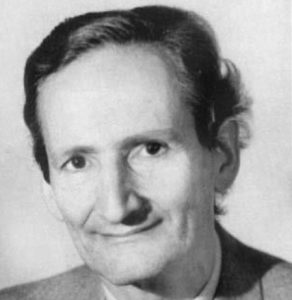József Hatvany
In 1947, he was the head of the Education Department at the Free Trade Union of Hungarian Engineers and Technicians, and between 1948 and 1950, he was an associate professor at the Budapest University of Economics (BKE) and its predecessor institution.
From 1950 to 1952 he worked in the office of the Hungarian Academy of Sciences. He was imprisoned between 1952 and 1956 on trumped-up charges; during his prison years he outlined the ideas for a numerically controlled factory. After his release in early 1956, he was reinstated as head of the Presidential Secretariat of the Hungarian Academy of Sciences.
Between 1957 and 1960, he worked at the Cybernetics Research Group (KKCS) of the Hungarian Academy of Sciences, where he contributed to the creation of the first Hungarian computer, the M-3.
From 1960 he was a member of the Central Research Laboratory for Measurement Technology (MKKL).
From 1965 until his death, he worked at the Hungarian Academy of Sciences' Automation Research Institute (AKI), and from 1973 at its successor, the Computer Science and Automation Research Institute (SZTAKI), where he dealt with issues of automation in the mechanical industry. He was an internationally renowned researcher in computer-aided design (CAD) and numerically controlled machine tools. He is credited with the implementation of a graphical display and a multi-dimensional machine tool control capable of automatically creating complex surfaces. – He took a pioneering role in the development of domestic tools for geometric modeling and computer graphics. His tools for shape and position recognition contributed to increasing the intelligence of robots. – He has published more than 170 publications.
He obtained his PhD in Technical Sciences in the late sixties.
He was a consulting member of the Department of Engineering Sciences of the Hungarian Academy of Sciences, a member of the Systems Engineering Committee of the Hungarian Academy of Sciences, the Scientific and Educational Committee of the Mechanical Engineering Scientific Association (GTE), and the Measurement Technology and Automation Association (MATE).
He was a member of the Society for Information Display (SID) from 1971, the International Federation for Information Processing (IFIP) from 1973, and the International Institution for Research Production Engineering (CIRP) from 1984. In 1984, he was elected a fellow of the US National Academy of Engineering.
He was a member of the editorial board of several foreign journals (e.g. Computer Aided Design, International Journal of Man-Machine Studies, Computers and Graphics, Computers in Industry, Robotics and Computer-Integrated Manufacturing).
He taught at the Budapest University of Technology (BME) as an honorary university professor from 1975. – In 1984, he was awarded an honorary doctorate by the University of Toulouse.
He created a school that continued to operate after his death by educating young talents, providing them with scholarships and opportunities to study abroad, which (especially in the first period) provided exceptional opportunities for the professional development of young people.
As a result of respect for the memory of József Hatvany and the love of his former students, the József Hatvany Doctoral School of Informatics Sciences was established at the Faculty of Mechanical Engineering of the University of Miskolc (ME) in 2000.
His awards: State Award (1978); in 1984, the Pattantyús-Ábrahám Géza Memorial Medal (GTE, 1984).
József Hatvany's daughter, Helga Hatvany, wrote a book about the Hatvany family and, of course, about her father, entitled "Turbulent Times - The Legendary Legacy of the Hatvany Family" (Libri Könyvkiadó, Budapest, 2023.)
Created: 2016.06.28. 22:42
Last modified: 2024.06.03. 18:30

